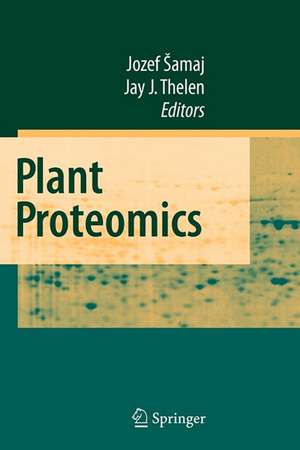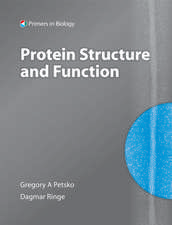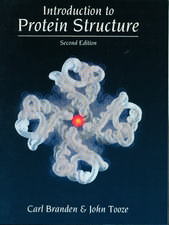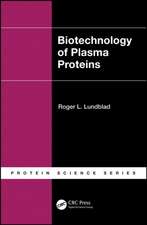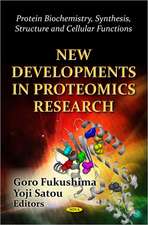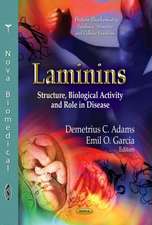Plant Proteomics
Editat de Jozef Samaj, Jay J. Thelenen Limba Engleză Paperback – 15 oct 2010
Plant Proteomics highlights the rapid progress in this field in plants, with emphasis on recent work in model plant species, subcellular organelles, and specific aspects of the plant life cycle such as signalling, reproduction and stress physiology. Diverse integrated approaches, including advanced proteomic techniques combined with functional genomics, bioinformatics, metabolomics and molecular cell biology, are presented in several chapters, making this book a valuable resource for a broad spectrum of readers ranging from teachers and advanced students to researchers.
| Toate formatele și edițiile | Preț | Express |
|---|---|---|
| Paperback (1) | 1216.30 lei 6-8 săpt. | |
| Springer Berlin, Heidelberg – 15 oct 2010 | 1216.30 lei 6-8 săpt. | |
| Hardback (1) | 1227.84 lei 6-8 săpt. | |
| Springer Berlin, Heidelberg – 11 sep 2007 | 1227.84 lei 6-8 săpt. |
Preț: 1216.30 lei
Preț vechi: 1483.29 lei
-18% Nou
Puncte Express: 1824
Preț estimativ în valută:
232.73€ • 243.65$ • 192.58£
232.73€ • 243.65$ • 192.58£
Carte tipărită la comandă
Livrare economică 05-19 aprilie
Preluare comenzi: 021 569.72.76
Specificații
ISBN-13: 9783642091643
ISBN-10: 3642091644
Pagini: 400
Ilustrații: XXIX, 369 p.
Dimensiuni: 155 x 235 x 21 mm
Greutate: 0.56 kg
Ediția:Softcover reprint of hardcover 1st ed. 2007
Editura: Springer Berlin, Heidelberg
Colecția Springer
Locul publicării:Berlin, Heidelberg, Germany
ISBN-10: 3642091644
Pagini: 400
Ilustrații: XXIX, 369 p.
Dimensiuni: 155 x 235 x 21 mm
Greutate: 0.56 kg
Ediția:Softcover reprint of hardcover 1st ed. 2007
Editura: Springer Berlin, Heidelberg
Colecția Springer
Locul publicării:Berlin, Heidelberg, Germany
Public țintă
ResearchCuprins
to Proteomics: a Brief Historical Perspective on Contemporary Approaches.- High-Resolution Two-Dimensional Gel Electrophoresis: A Cornerstone of Plant Proteomics.- An Introduction to Proteomics Data Analysis.- Phosphoproteomics in Plants.- High-Throughput Identification of Plant Protein Kinase Substrates.- Discovery via Proteomics of a Novel Cell Signalling Pathway in Plants Involving Extracellular ATP.- Cereal Proteomics.- Current Status of Arabidopsis Thaliana Proteomics.- Proteomics of Medicago truncatula.- Proteomics of Seed Development in Oilseed Crops.- Proteome Analysis of Nicotiana tabacum Suspension Cultures.- Cell Wall Proteome.- Plasma Membrane Proteomics.- The Proteomes of Chloroplasts and other Plastids.- The Plant Mitochondrial Proteome.- Proteomic Analysis of the Plant Nucleolus.- Pollen and Pollen Tube Proteomics.- Plant Proteomics Upon Fungal Attack.- Metabolic Intricacies of the Symbiotic Association between Soybean and Bradyrhizobium japonicum:A Proteomic Outlook.- Proteomes in Arbuscular Mycorrhizal Symbiosis.- Plant Proteome Responses to Abiotic Stress.
Notă biografică
Jozef Šamaj received his Ph.D. degree in Plant Physiology from the Comenius University in Bratislava, Slovakia. He completed three post-doctoral programmes supported by Eurosilva, the Alexander von Humboldt Foundation, and the EU Marie Curie Programme in the highly regarded laboratories of Alain Boudet in Toulouse, Dieter Volkmann in Bonn, and Heribert Hirt in Vienna. He worked on the cell biology of somatic embryogenesis, lignification in tree species, arabinogalactan proteins, the cytoskeleton, and signalling proteins. Jozef Šamaj has co-edited three books and co-authored more than 75 research papers, reviews, and book chapters. He is a senior lecturer and group leader at the Institute of Cellular and Molecular Botany in Bonn, Germany, and senior researcher at the Institute of Plant Genetics and Biotechnology, Slovak Academy of Sciences, Nitra, Slovakia. His current research is focussed on the role of signalling components and the cytoskeleton in relation to the vesicular trafficking during plant development and stress responses using integrated cell-biological and functional proteomics approaches.
Jay Thelen received his B.Sc. degree in Biology and Biochemistry from the University of Nebraska-Lincoln in 1993. He earned his Ph.D. from the University of Missouri-Columbia (UMC) studying the structure and regulation of plant mitochondrial pyruvate dehydrogenase complexes under the guidance of Douglas Randall. In 1999 he started a 3-year postdoctoral position in John Ohlrogge’s lab at Michigan State University investigating the plastid acetyl-CoA carboxylase protein complex. He returned to UMC in 2002 as the Associate Director of a campus Proteomics Center. In 2004, he was promoted to Assistant Professor in the Biochemistry Department, a position he currently holds. He has authored or co-authored 35 research and review articles since 1994. His research interests are centered around the regulation of plant metabolism, particularly carbon assimilation inoilseeds, and multienzyme metabolic complexes. He is currently studying seed filling in numerous crop oilseeds, using various quantitative proteomics approaches. He is also investigating global phosphoprotein networks involved in seed development and is developing improved strategies for quantitative proteomics.
Jay Thelen received his B.Sc. degree in Biology and Biochemistry from the University of Nebraska-Lincoln in 1993. He earned his Ph.D. from the University of Missouri-Columbia (UMC) studying the structure and regulation of plant mitochondrial pyruvate dehydrogenase complexes under the guidance of Douglas Randall. In 1999 he started a 3-year postdoctoral position in John Ohlrogge’s lab at Michigan State University investigating the plastid acetyl-CoA carboxylase protein complex. He returned to UMC in 2002 as the Associate Director of a campus Proteomics Center. In 2004, he was promoted to Assistant Professor in the Biochemistry Department, a position he currently holds. He has authored or co-authored 35 research and review articles since 1994. His research interests are centered around the regulation of plant metabolism, particularly carbon assimilation inoilseeds, and multienzyme metabolic complexes. He is currently studying seed filling in numerous crop oilseeds, using various quantitative proteomics approaches. He is also investigating global phosphoprotein networks involved in seed development and is developing improved strategies for quantitative proteomics.
Textul de pe ultima copertă
Proteomics is the large-scale functional analysis of proteins extracted from intact organisms, tissues, individual cells, or cell compartments, at defined timepoints during development or under specific conditions.
Plant Proteomics highlights the rapid progress in this field in plants, with emphasis on recent work in model plant species, subcellular organelles, and specific aspects of the plant life cycle such as signalling, reproduction and stress physiology. Diverse integrated approaches, including advanced proteomic techniques combined with functional genomics, bioinformatics, metabolomics and molecular cell biology, are presented in several chapters, making this book a valuable resource for a broad spectrum of readers ranging from teachers and advanced students to researchers.
Plant Proteomics highlights the rapid progress in this field in plants, with emphasis on recent work in model plant species, subcellular organelles, and specific aspects of the plant life cycle such as signalling, reproduction and stress physiology. Diverse integrated approaches, including advanced proteomic techniques combined with functional genomics, bioinformatics, metabolomics and molecular cell biology, are presented in several chapters, making this book a valuable resource for a broad spectrum of readers ranging from teachers and advanced students to researchers.
Caracteristici
Most comprehensive synthesis of the current knowledge in the field of plant proteomics including new methodological approaches on model plant species, subcellular organelles, plant-microorganism interactions, signalling, plant reproduction and stress resoponses Written for a broad spectrum of readers such as researchers, teachers and advanced students Includes supplementary material: sn.pub/extras
